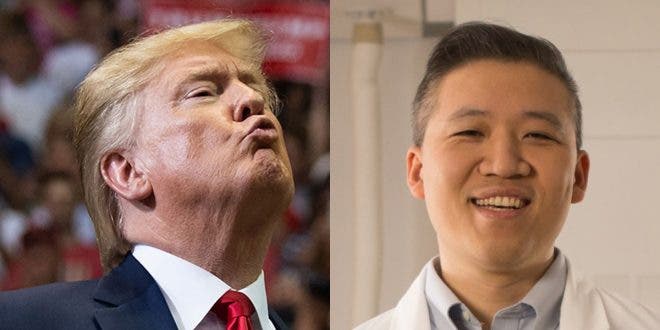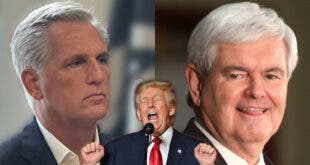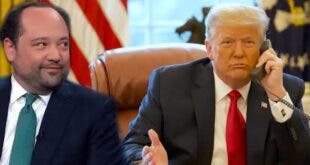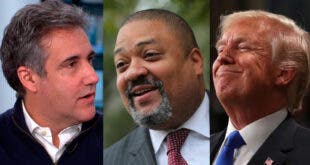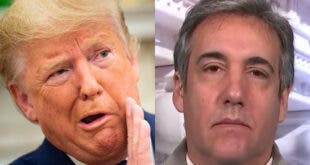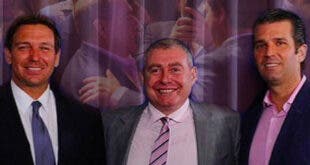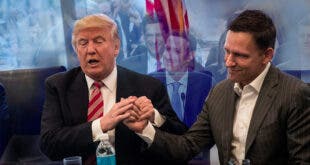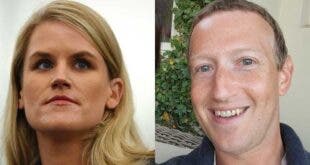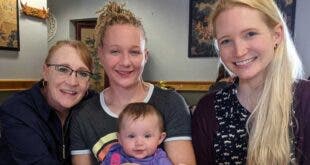Scott speaks with Dr. Eric Feigl-Ding, a Harvard epidemiologist and health economist. Dr. Ding was the first American scientist to sound the alarm about coronavirus in a truly large way. It’s not easy to achieve clarity in a crisis, even less so when the crisis is budding and hasn’t yet become a full-on catastrophe. But that’s what Dr. Ding achieved.
Now, he’s here speak with us and blow the whistle on Trump’s Tulsa rally as a potential super spreader event. He even explained the differences between the massive Black Lives Matter protests across America and the Trump political event, and why it could be so much more dangerous for more than just those who attend, but their families and communities.
You can follow Dr. Eric Feigl-Ding on Twitter @DrEricDing.
Click here to buy our book about the 2020 Democratic presidential nominee, Joe Biden.
Here’s the transcript:
Dr. Ding Interview
Scott Dworkin: I’m here with Dr. Eric Ding. He’s a Harvard public health scientist for the last 16 plus years, as well as an epidemiologist and a health economist. Hey doc, thank you for joining me. How are you today?
Dr. Eric Ding: I’m alright, how are you?
Scott Dworkin: Well. You know, given the situation we’re in. I’m isolated. I’m healthy.
I want to ask you a few questions about the wisdom or lack thereof of Trump’s plan to hold an indoor political rally in Tulsa on Saturday with people across the country that. Probably a majority of them, even though the handout mass, they do not require them to wear the mask inside.
And then they’re also going to have overflow outside of possibly one and a half times or two times the crowd size on the outside as well. And they’ll be in that same area with each other for a long time. But first, can you please tell our listeners a bit about yourself and about the coronavirus tweet “heard around the world” that you posted this past January.
Dr. Eric Ding: I’ve been monitoring this epidemic for quite a while. And even before, the news reached, the U S. I grew really concerned in January. The information I got from China plus the latest study basically indicated this was going to be a really, really bad epidemic.
And I want us to warn the world. back then, I only had 2000 Twitter followers. And so I. I had to use what I could to warn it in the loudest way possible. So as many people could hear it. And so I tweeted that this will be a ‘Holy mother ‘of God, thermonuclear level pandemic, bad, event.’ And back then, in January, many people dismissed it as fear-mongering.
But,I wasn’t, because I’ve been a whistleblower before as an epidemiologist against dangerous drugs that pharma has been pedaling as well. But when I saw this, I just had to speak up and took some heat for it. But it’s, it is, we are in this crazy, crazy pandemic that we are in now. It’s kind of bittersweet, but right now, we just have to try to find every way we can to stop the epidemic.
No, I understand. I, helped blow. It was still on Russia in November 2016 and running through the halls of Congress a few days after the election. people looked at me like, ‘are you crazy?’ Like ‘there’s no, there’s no interference with Russia.’ New York times is like, no, ‘there was no interference.’ And then like, obviously we kept digging and, and things change.
Scott Dworkin: And so, I’m glad that you went with your gut and trusted your gut and didn’t listen to propaganda or foreign influence or, or even, you know, domestic influence where they try and spin things in a different way. Talking about Tulsa, is it actually a good public health idea?
And I know, you know, this may be a leading question, but is it actually a good public health idea to hold a heavily attended large event with a crowd of up to 20,000 people who are opposed to wearing masks, but packed in a tight space for hours for the sake of cheering on a speaker.
Dr. Eric Ding: Yeah, I think it is very dangerous.
And you know, I’m an epidemiologist first and foremost. The data clearly shows that Oklahoma – and Texas as well – is experiencing a really record-high increase, just compare this week versus last week, Oklahoma’s cases have risen 140%. It has more than doubled and a half. and that’s why I’m really concerned. Because we’re basically walking into the middle of an epidemic – a surging epidemic – and having a massive gathering of people, many of which are posed to masks, and indoors.
And I want to contrast that with a lot of the Black Lives Matter protests. Cause a lot of people ask this, first of all, a lot of, Black Lives Matter protesters did were masks, the vast majority, and it was outdoors. So I think this is night and day. When it’s indoors, the vast majority, not wearing masks potentially, that [portends] a serious, serious problem.
Scott Dworkin: Are there national implications of this, like this many people coming around from around the country, around the state, neighboring States or whatnot, and then leaving the state. It seems like it’s going to be hard to track down people if they were infected.
It seems like there’s definitely going to be, or most likely, there would be positive for coronavirus at the event. Like it’s inevitable based on the numbers and what’s been happening. I like how, how bad could an event of 20,000 people be?
Dr. Eric Ding: A very bad event. It could be definitely a very bad event. We know this epidemic has a tendency to super spread whenever, given the chance; whether it’s Korea’s nightclubs or the new flare-up in China of, in a marketplace or tons of other, churches and choir practices. We know that if given the chance indoors, it will super spread in a very, very—unpredictable way.
People from across the country, coming in and then returning to where they came from, also creates a huge, huge tracking problem. Luckily, they do have a registration for this event. So if Brad Parscale [Trump’s campaign manager and the GOP, or the Trump campaign wanted to share for tracking purposes, for tracing purposes, they actually have a roster, which is better than most events, right?
The question is, are they going to share it if such an event?
And a lot of people could actually have the virus, even if everyone who enters has zero fever, temperature, cough because we know anywhere from 20 to 50% of the people with the virus are asymptomatic or presymptomatic, and it’s showing no signs whatsoever, but we know they are still infectious.
This is why, how, even if we have a perfectly healthy 19-20,000 indoor stadium of people shouting, and they all think they’re healthy, it could create a super spreading event.
Scott Dworkin: I have to ask you about a new study. And I’m not sure how reliable it is, but it’s about asymptomatic carriers in nature.com, which says that they too – asymptomatic carriers – exhibit physical symptoms. How important do you think that could be and why?
Dr. Eric Ding: I think asymptomatic carriers are the most pernicious part of this virus.
It is the reason that once you quash everyone, who’s sick, [cases] keep flaring up in Korea, in China, and tons of other places where you think you have solved the epidemic. And so this is why it is such a, such a problem. and with so many people. coming together, asymptomatically transmitting it.
They might feel fine – again, oftentimes it’s young people, 20 to 29, who are the people who are super spreading and initiating outbreak clusters – that they will bring it back to mom, dad, grandma, and grandpa. And that will create serious problems.
Scott Dworkin: How does what you’ve you’ve said, you know, about the event in Tulsa apply to say, for example, AMC movie theaters, who recently announced that they wouldn’t require mask-wearing because, in the CEO’s mind, it’s “political.” How does that apply to things like that?
Dr. Eric Ding: Yeah, well, first of all, it depends AMC is not political, but the virus could care less about your political ideology. All the virus cares about is ‘are you going to spray me in droplet form when you talk? When you laugh? When you cough?’ and you know, ‘is there anyone in the vicinity, to catch it if I’m not wearing a mask?’
And the other key thing is they’re actually also endangering the workers because that’s actually the number one reason that a second and smoking and smoking restaurants with a ban. Because it’s actually endangering workers, even if a business wants to allow customers to do it because workers, they are not able to choose, to avoid it. Right?
That’s why in movie theaters, I think it’s really responsible for saying hi, you can choose if you want.
No, for public health sake, we need everyone to wear a mask, and wearing a mask is a matter of social responsibility.
Cause masks protect others from you, especially cloth masks. And that’s why in order for it to work, everyone has to do it.
And we know that if everyone wears it, we can avoid social distancing. If 95% of the people wear it, and we can lower an R0 [transmission rate] of four down to less than one, and stop the epidemic. I think that it is way less painful to just wear a mask than to have shutdowns and lockdowns. So, it’s a little bit of inconvenience to avoid a ton of pain. And so I just wish people would just adopt this simple measure.
Again, it’s not like permanent castration or vasectomy of your manhood, that many on, on the right field that it is that makes them feel weak or look weak. No, it is, it is the most sensible thing, and it’s way less painful than a nationwide lockdown.
Scott Dworkin: Right. And I don’t want to wear a mask. I don’t want to stay at home. I don’t want to do any, like; I don’t, I don’t want to, it’s not like, yeah. ‘Ha! I want to force you to wear a mask or whatever.’ It’s just it’s the right thing to do. And I get that some people have anxiety about it, but I mean; I’m pretty sure everybody has anxiety cause it’s a reminder on your face that, ‘Hey! There’s an epidemic right now. ‘ You need to be careful about what you’re doing.
It’s, it’s just really, it’s really hard to grasp exactly why they, the widespread kind of lies about masking.
Dr. Eric Ding: It’s mind-boggling.
Scott Dworkin: So, so is it possible to, is it possible to even, I guess they call to crush the curve if people are out and about, and we’re not wearing masks.
Can we just expect a sooner, second wave is the first wave, never going to end? How bad are the implications? And is the only way we can “crush the curve” by wearing masks in public if we’re going to be in public?
Dr. Eric Ding: Yeah, I think social distancing is not enough without masks. We know it slows, it, slows it down. Look, we’ve kind of ended up on this Mesa, a plateau, in our country. Right? And now it’s going back up again. Adoption of mask-wearing in all the other countries, especially Asia, we’re really, really comprehensive., or the lockdown, it was way tighter. But here in the US our lock downtown – by the way I locked down rules or half a page, our waivers and exemptions are two pages long – our lockdowns are very, very laissez-faire. They’re very weak. And our mask compliance is incredibly weak. And altogether, this just creates a terrible formula in which, we’re unable to crush the curve. Whether we’re in second wave or first wave, it’s, it’s semantics. In some ways, you know, Arizona and Oklahoma have the first surge. Right?
But, but in the US, technically, I would say we’re in the second peak of the first wave because we never even crushed the first wave at all.
Scott Dworkin: Recently, Trump said again that the coronavirus is going to “go away.”
Is it really going away? What is the reality of how bad it’s become all across America right now?
Dr. Eric Ding: Yeah. It’s not going to go away by itself. We know that by the dynamics of the virus right now that this is a pandemic virus. It’s here to stay until we have a full vaccine. But until then we have to choose: how many people get sick and debilitated? And die? And there are people who are saying ‘herd immunity!’
No. Herd immunity, I want to repeat, does not work.
And just for people who are not familiar, herd immunity, the theory that if enough people are immune to it, then, you can prevent transmission, for the most part across the population. But that only works when you’re at minimum 60%, but optimally 80% or more immune.
And we’re not even close to New York City. in the worst, worst, worst epidemic, epicenter only has 20% those who have tested positive antibodies. Those who want us to do the ‘plow through’ approach and just, ‘well, let’s just get to 80.’ Well, you would basically multiply New York city about four times; the mortality. And that is just an astronomical amount of suffering because one in 500 New York City residents has already died. Residents, not just one in 500 people infected.
We do not want to repeat New York city across the country. So, please, no more talking to the ‘herd immunity.’ And we have to focus on slowing this down.
Again, we can’t shut down forever, so, if we want businesses to come back, we need to wear masks and AMC to say, ‘well, if you don’t want, you don’t have to choose where masks,’ trust me, your businesses will create our way more when you say, Oh, you can choose to wear masks or not less people will kind of come.
It’s like Jurassic Park. If you try to open Jurassic Park where the velociraptors are still roaming around, will people even income? If you open it, people will not really come back. And so the only way to solve it is to crush the curve with mask-wearing.
Scott Dworkin: I’ve seen bars and restaurants across the country shut down after one case tracks back to them, and they shut down sometimes for good because of it cause people won’t go back there. so the risk is just; it seems insane. You know with the death total right now, which is according to an opinion piece in the New York times higher than, than the 120,000 plus that has been [reported] by John Hopkins. I saw a study that said that the coronavirus death total would be lower if Trump acted earlier.
Is that the truth? If Trump had acted earlier, would we have, been more prepared, and would fewer Americans have died?
Dr. Eric Ding: Yeah, absolutely. And we know that if he had just acted two weeks earlier, back in March, we could have avoided 90% of this epidemic. 90%. Cause this; this formula is exponential.
Remember, this virus has an R0 [attack rate] between three and four R0 being for every infected person who infects three to four additional [persons], and each of those three or four additional infects an additional three or four additional. If you can nip an exponential, transmission like that early on, you can stop almost the entire epidemic.
That’s actually what a lot of countries have done. This is why many countries do not even have such a peak as we have; they just basically were able to crush it very easily. I think the best example actually in Europe is the Czech Republic. They had a mandatory mask wearing for everyone, and they had a very short shutdown period.
And now the epidemic has gone, and now people don’t need to wear a mask anymore. People are outside people; kids are in school learning again. all because they were compliant with masks. They listened to public health leaders, and now they can enjoy their life again. We were defiant with our “rugged individualism,” but now we’re paying the price for our rugged individualism, and that is this little ‘purgatory that we live in of this. Do we have an epidemic that’s really bad or not?’ We’re going to have a flare-up around the corner where there’s Tulsa for the next MAGA rally. It is just, you know, it’s nerve-wracking to have to live like this, especially our kids being out of school and just suffering.
Yeah. They told me, at least from what I’ve seen, that he’s planning 30, 30 to 50 rallies between now and election day. And so. I assume that that’s probably, not the best idea.
It is though it is the worst idea in a long list of bad ideas and policies because it’s one thing where you bought a reaction because you were slow initially in reacting where you could maybe are you, well, we just didn’t know how bad it was.
Now, we know how bad it is yet. We are still committing ourselves. To like seppuku [Japanese ritual suicide] in which you’re actually, you know, gutting yourself and, basically, undermining all the work that we’ve done. So we’ve slowed the epidemic at a price where the public, a couple of trillion dollars in an economy and, you know, double-digit millions and unemployment.
We paid a hefty price. Now let’s get our business economy running, but no, we’re just going to have to undermine everything we’ve done once the resurgence hits back to where we had it in the peak; we will have basically lost all that money and resources, the unemployment, and suffering all for nothing because I think we’re going to return to the peak of where we were earlier very soon at this rate. And so it, it is literally throwing money and energy and human suffering into the fire, all the same time.
So, are more state shutdowns inevitable, or are they going to be extended from here? Is there worse yet to come.
I think if, if States do not act, the worst is yet to come, many governors right now are kind of like, you know, a wavering between, you know, should we put a mandatory math school?
Should we do a lot down Gavin Newsome, unfortunately, put in a state, mandatory mask, public mask, wedding rule, other states have it, but it’s not well enforced. but Nebraska took the opposite approach, and the governor basically said, Hey, if any municipalities or local governments impose any mandatory mask rule, we will strip you of Cares [Act] relief funding.
And that is just the worst thing. Like, first of all, I thought conservatives, governors, believe in small government, but for them to basically create rules that you cannot do that. It’s just mind-boggling. Gov. Greg Abbott of Texas also said no municipality is allowed to pass mandatory mask-wearing rules.
And I have no idea why they’re doing that, but they are just undermining themselves and shooting themselves in the foot and basically seeding a worse epidemic. And I don’t understand politically; I think a lot of these governors that pledge fealty to Trump and their position reopened—reopened, regardless of what at all costs.
And I think American people will suffer. And I think history will judge them very poorly, to say the least.
Scott Dworkin: Yeah. I think when we look back at this, it’s, we’re going to be like, I don’t know why they said this. Why were they trying to cover it up? Why were they trying to lie about it? Why we were trying to act like it would go away when it wasn’t.
is it, is it fair to say political ideology will correlate with a higher or lower infection rate? I mean, I know like, as in, let me explain, I guess, Republicans versus Democrats. Because Democrats; most Democrats seem to be wearing masks. Most Republicans seem to not be wearing masks. Is there going to be a correlation between more Republicans are going to get sick or is it not going to matter because you know, of the makeup of the people and the spreading or whatnot, because they could spread it to other people or is it too confusing?
Dr. Eric Ding: First of all, I would say that you know, a lot of blue areas are more urban and the virus tends to spread in urban areas more. Having said that, I think in terms of the change going forward of the epidemic, I think States with Republican governors who have a tendency to pledge loyalty to Trump will have, I think, potentially worse outcomes. A Kaiser foundation analysis, they’ve already done two analyses, one in April, one in June, and they’ve already shown that the Republican States have a worse trajectory of change; or worse, greater growth of the epidemic. But I think it ultimately, it’s not a blue state/red state issue this virus. The United States is like a leaky ship. And, it has like all these holes.
If you plug even half the holes, the ship will continue to think because we don’t have bulkheads between States. We don’t have real borders. So, you know, if an epidemic flares up in a red state, it will leak over into a blue state for sure. Guaranteed. So we were the United States of America.
We have to act like a United country where we think of not just ourselves, but also our neighbors. It could be that red states, with people who don’t wear masks, get sick, but you know what, the can still infect grandma, grandpa, aunts, and uncles, friends, and other acquaintances at the meet who are spanning the entire political spectrum.
The outbreak does not care. The virus is agnostic. It will spread to whomever. Ultimately everyone will suffer. So we’re in the collective interest to stop this Tulsa rally and future rallies. There’s a lot of schadenfreude, out there among some liberals and I think that’s very narrow-minded. Like, Oh, don’t get sick. You know, Darwin will do its own thing. I think that’s a very negative view because, ultimately, everyone will get sick if this epidemic gets out of hand.
Scott Dworkin: And, you know, I would say that the last question I have for you is probably, I don’t want maybe the scariest question I’ve ever asked anybody ever.
And I’ve asked a lot of, a lot of questions on the show. so, you know, I guess just for a reality check for people. How bad could it get if we stay in this scenario? Like, what is the worst-case scenario here? Just so, so people are aware.
Dr. Eric Ding: The worst-case scenario, if we are not able to contain it? Well, this thing is going to keep burning until we get a vaccine.
And by the way, a vaccine, we need a vaccine that will almost 80, 90% of the people will need to get. And that will take at least until summer of 2021 for everyone to get the vaccine, if not potentially even later. If we don’t keep it in check, if we don’t wear the masks – and obviously shutdowns, it’s very difficult to do longterm – but we don’t wear the masks, we are talking about not just 150,000 deaths that we’re approaching, we’re talking about. 300, 400,000 easily. Four hundred thousand deaths are the number of deaths in all of World War II from America. We could approach even almost a million if this thing keeps burning. Obviously, I hope we never reached that day, and I hope that we will contain it. Right now, at best, this is not going to stop until at least 200,000 deaths.
And that’s assuming we have good mask compliance in place. But this could get really, really bad. And in the 1918 Spanish flu pandemic, we talk about millions of people who die. And I hope I hope and pray we never even come close to that. But it is not beyond the realm of possibility that this pandemic could be that bad if we are just completely laissez-faire, and ignore it, and just plow through, and let it burn out because it will burn down half the economy along with it.
if we, if we let, let that happen. And so please, please, please, anyone. attending the rally or anyone knowing them begged them not to stay or at least wear a mask or listen from outside and please avoid such gatherings and encourage anyone who went to quarantine themselves for 14 days after they come back, do anything you can to minimize this.
And I encourage every governor out there listening. Please put the mandatory public mask, wearing rules in place. It is the least expensive thing our healthcare system, our society, our economy that we can do so that we can hopefully send their kids back to school in the fall. But if, until we have mask wearing for 95% of the population, we’re not going to be able to stop this epidemic; and all of us will suffer.
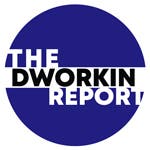 The Dworkin Report Powering #TheResistance every day…
The Dworkin Report Powering #TheResistance every day…
